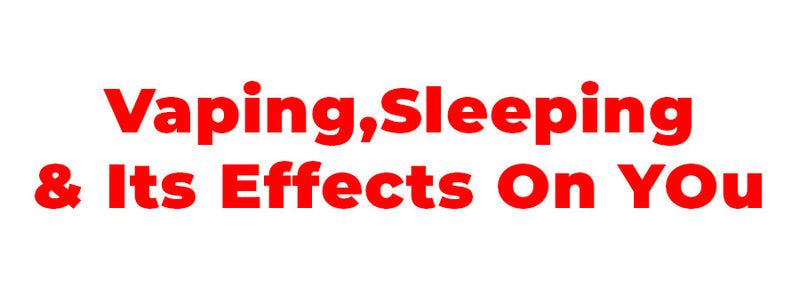Have you spent all night wondering how and why your vaping habits might be affecting your snooze time?
Well, we’re here to unravel the mystery of vaping’s impact on sleep quality!
Those late-night vape sessions may seem harmless or even relaxing, but the effects of nicotine and other substances in e-liquids could be sabotaging your precious rest. Nicotine, being a potent stimulant, has a knack for disturbing sleep patterns, and it’s not the only culprit.
If restless mornings and groggy days sound all too familiar, stick around. Let’s dive deep into the science behind vaping and its effects on sleep—and most importantly, how you can enjoy better rest.
How Does Vaping Affect Sleep?
Yes, vaping does affect sleep, and here’s how:
1. Nicotine’s Stimulant Effect
Nicotine is similar to caffeine in its ability to stimulate the central nervous system. It increases heart rate and blood pressure, making it harder for your body to relax before bed. This is especially noticeable for individuals who vape close to bedtime.
2. Nicotine Levels in Vapes
E-cigarettes and vape juices often contain higher nicotine concentrations than traditional cigarettes. For those transitioning from smoking to vaping, this adjustment period can amplify sleep difficulties.
3. Impact on Sleep Patterns
Research shows that nicotine users often experience fragmented sleep. Nicotine can disrupt the REM (Rapid Eye Movement) phase of sleep, which is essential for cognitive and emotional restoration.
4. Breathing Issues
Nicotine and other irritants in vaping products can inflame the throat and nasal passages, leading to breathing difficulties during sleep. This can cause frequent awakenings and poor sleep quality.
So, if you’re finding it hard to catch those Zs, your vape might be a significant factor.
Vaping and Sleep Disorders
1. Snoring and Sleep Apnea
Nicotine can worsen snoring by causing throat inflammation, narrowing the airway, and making breathing more laborious. If you already have sleep apnea—a condition where breathing repeatedly stops and starts during sleep—vaping can exacerbate it.
2. Asthma and Breathing Issues
Asthma sufferers may find that vaping triggers or worsens their symptoms, leading to interrupted sleep.
3. Withdrawal Symptoms
If you’re trying to quit smoking or vaping, nicotine withdrawal symptoms such as irritability, anxiety, and insomnia can further complicate your sleep.
Tips for Better Sleep While Vaping
Not all hope is lost! With some adjustments, you can minimize vaping’s impact on your sleep.
1. Lower Your Nicotine Intake
- Switch to e-liquids with a lower nicotine concentration.
- Gradually reduce nicotine levels until you transition to nicotine-free vape juices.
2. Avoid Vaping Before Bed
- Limit vaping in the hours leading up to bedtime to give your body time to relax.
- Establish a cutoff time, such as no vaping after dinner.
3. Practice Good Sleep Hygiene
- Limit Screen Time: Reduce exposure to blue light from devices before bed.
- Avoid Stimulants: Steer clear of caffeine, alcohol, or heavy meals late in the evening.
- Consistent Sleep Schedule: Go to bed and wake up at the same time every day.
- Relaxation Techniques: Try meditation, a warm bath, or soothing music before bed.
4. Consider Nicotine Alternatives
- Explore nicotine replacement therapy (NRT) products, but keep in mind they may also impact sleep due to their nicotine content.
- Seek support from healthcare professionals to quit nicotine altogether.
Conclusion
Vaping can significantly impact your sleep quality, primarily due to its nicotine content. Disrupted sleep not only leaves you groggy but also affects your overall health and well-being. By understanding the connection between vaping and sleep, you can take proactive steps to improve your habits and prioritize rest.
From reducing nicotine levels to creating a calming bedtime routine, the journey to better sleep is well within your reach. Your dreams—and mornings—will thank you!

